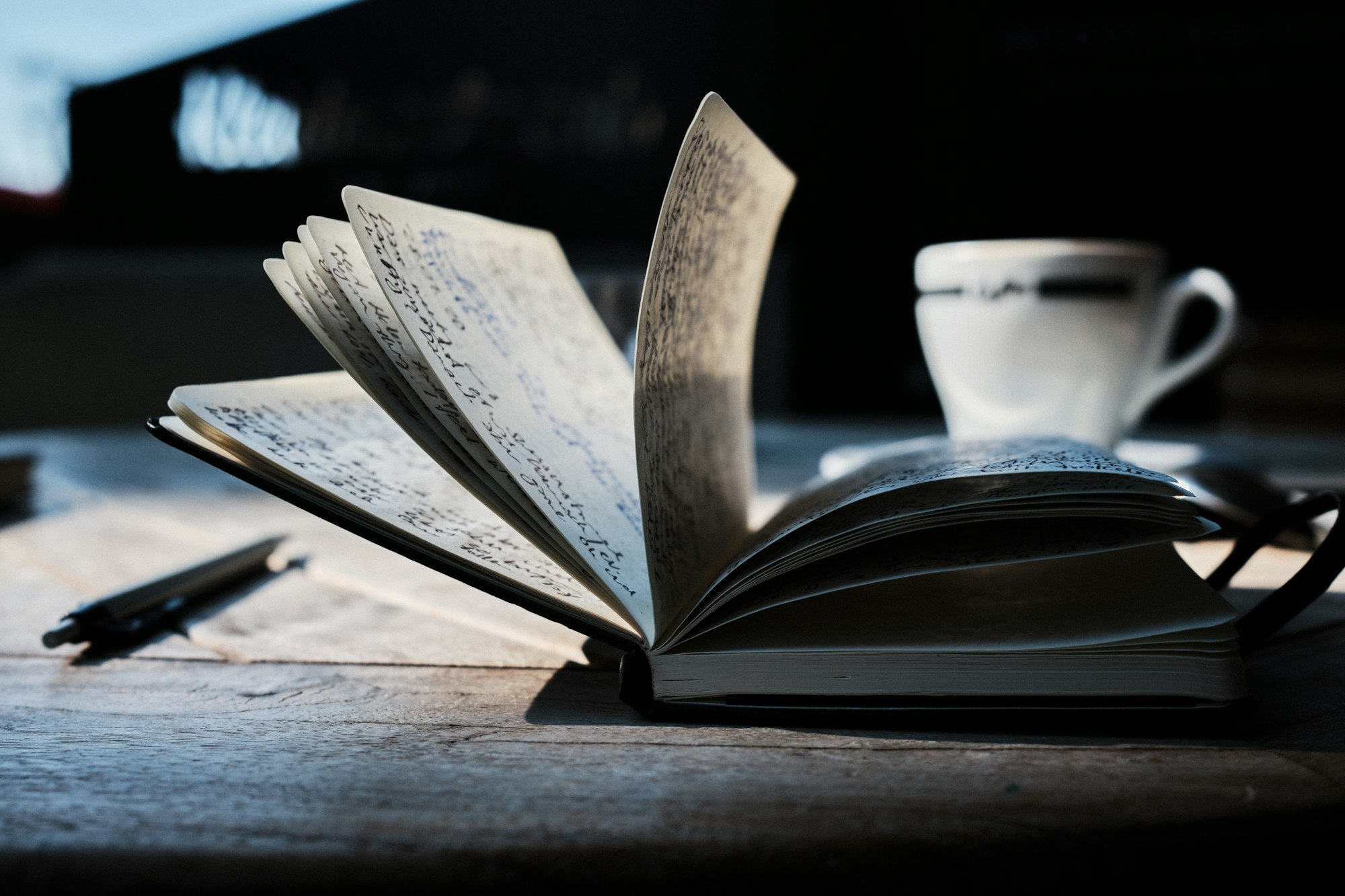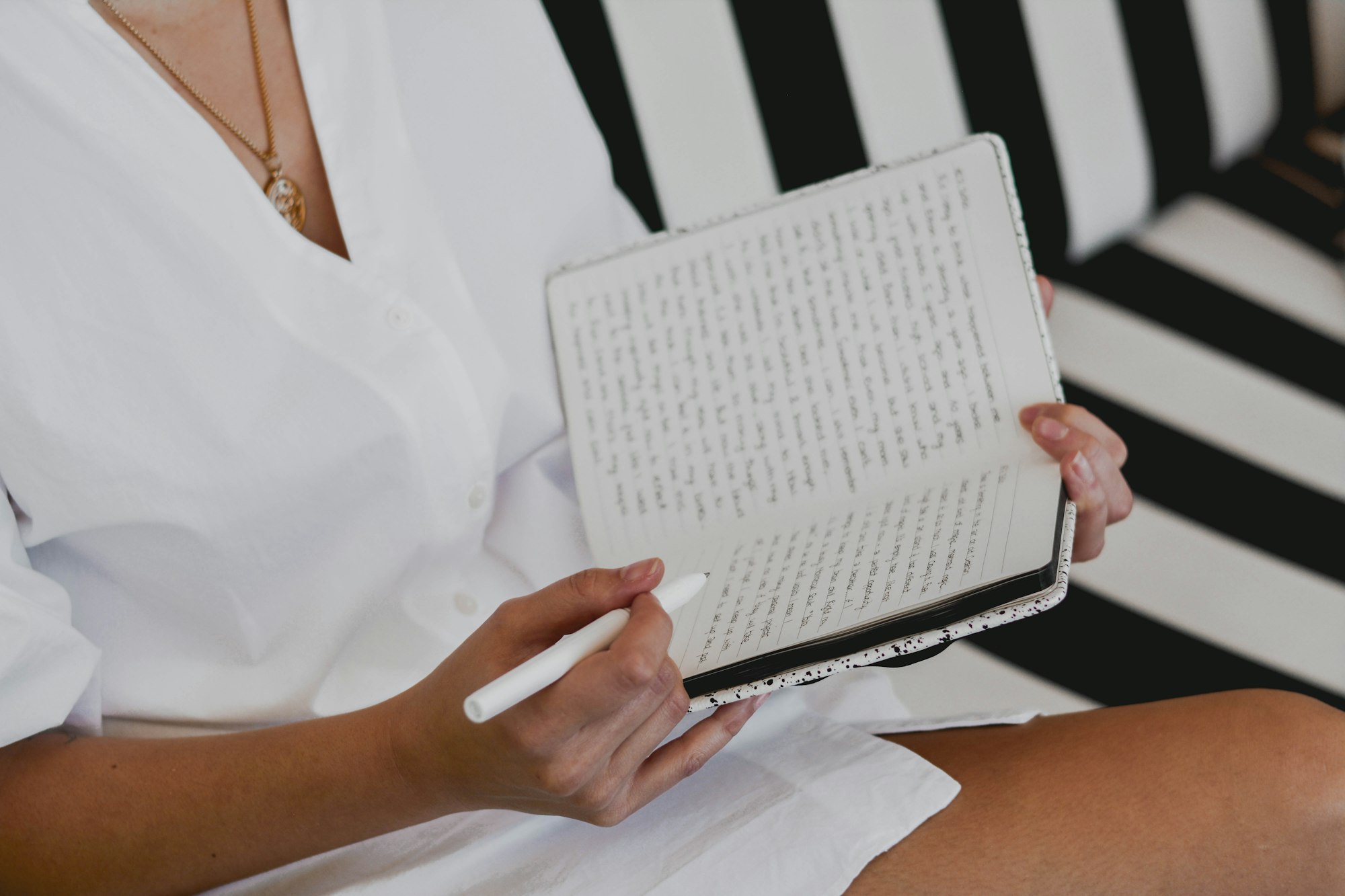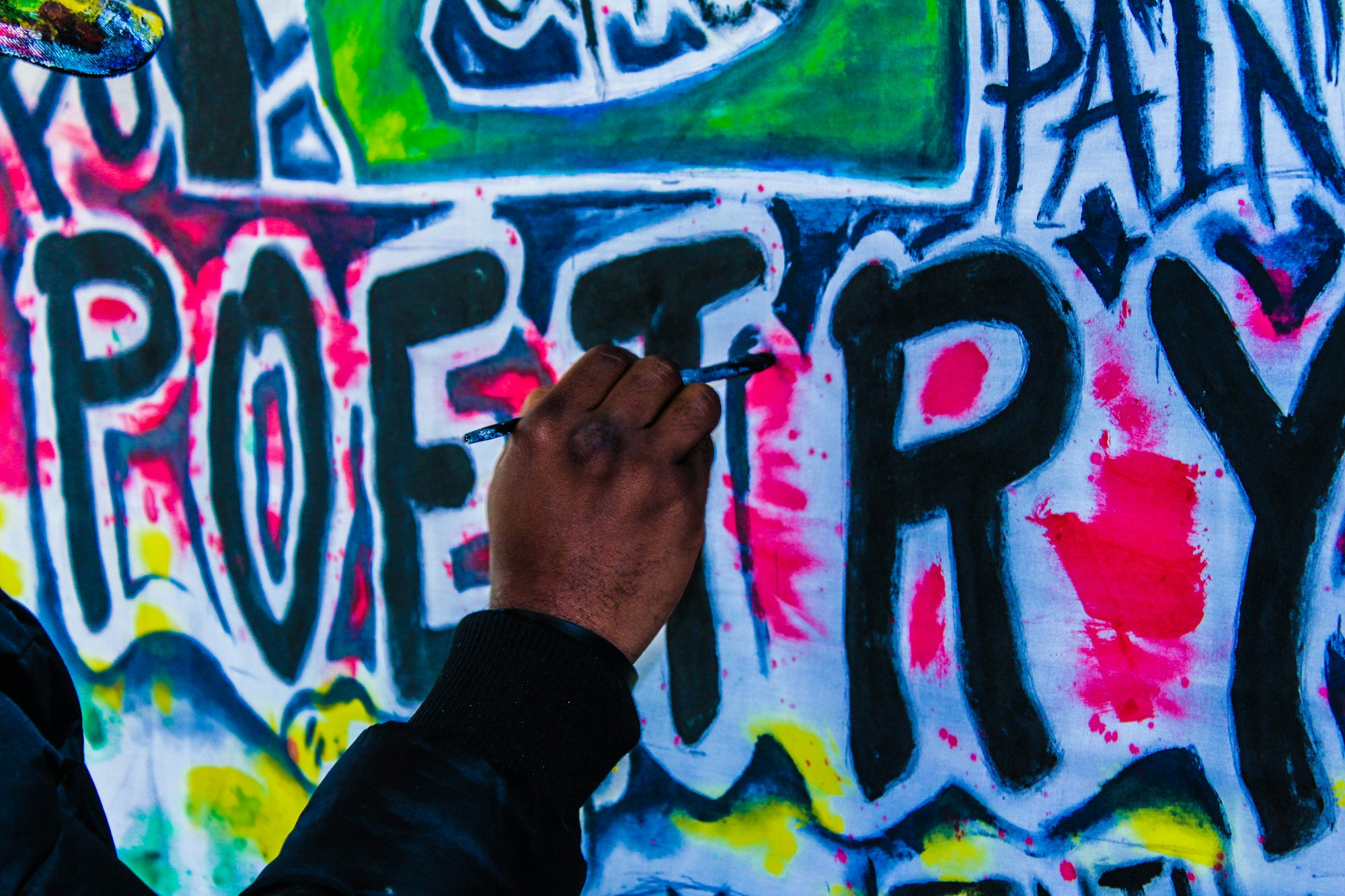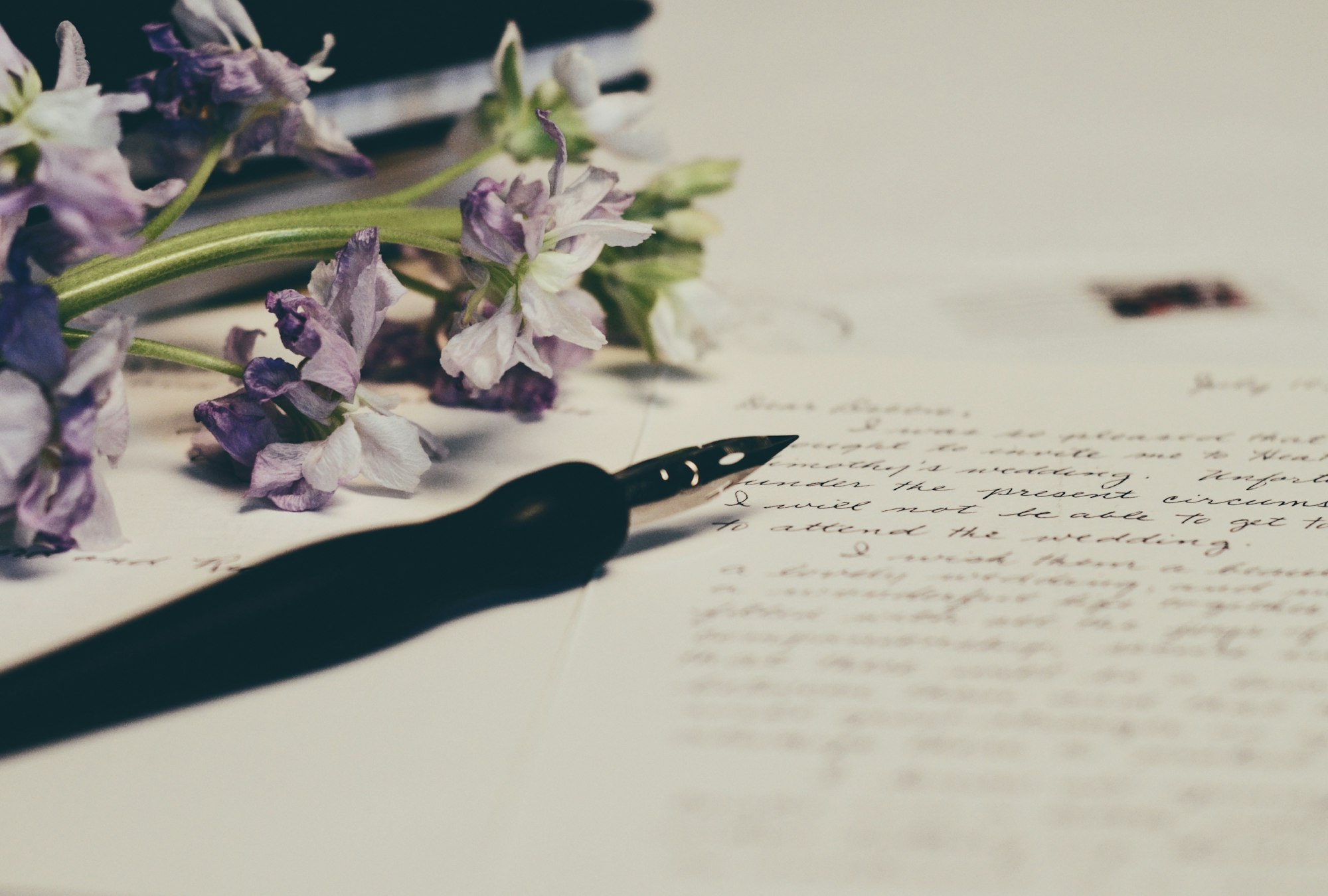When it comes to creative writing, it can be very difficult to know where to start and how you can improve your skills. Fortunately, there's loads of exercises to explore which will help you turn your ideas into artistic writing!
One thing to remember is that you don’t need to have a degree in English literature or creative writing to be an exceptional writer! The truth is, anyone with a passion for writing can learn and develop their fiction and non-fiction writing skills. We have put together the top 10 best creative writing tips for beginners to help you through your creative writing journey!

Ruth V Jarvis is a skilled author, editor and script consultant. From inspiring students to helping them learn new skills, Ruth is passionate about sharing her approach to creative writing within her workshops at Articulate.
Articulate is set in the London School of Mosaic studio in Gospel Oak, North West London. When visiting London School of Mosaic you can explore a wide range of artistic skills, from beginners mosaic courses to creative writing with Articulate.
Within this inspiring corner of London, students can develop their skills in writing fiction, non-fiction and poetry. Get the most out of your creative writing within interactive and supportive creative writing workshops with Ruth.
Book now on ObbyLooking for the best tips and tricks for creative writing success? We partnered up with Ruth to find out her top creative writing tips for beginners!
Top 10 Best Creative Writing Tips for Beginners:
- Find the Best Environment
- Freewriting
- Know Your Characters
- Don't be Scared of Drafting
- Keep a Writing Log
- Never Stop Reading
- Explore Your Emotions
- Get Perspective
- Research!
- Explore Ideas
1. Find the Best Environment
![Taken at a cozy little bookstore in Seattle. You can hang out as long as you’d like and read whatevers on the shelves [ IG: @clay.banks ]](https://images.unsplash.com/photo-1533327325824-76bc4e62d560?crop=entropy&cs=tinysrgb&fit=max&fm=jpg&ixid=MnwxMTc3M3wwfDF8c2VhcmNofDE2fHxjb3N5fGVufDB8fHx8MTY0OTMyOTM0Ng&ixlib=rb-1.2.1&q=80&w=2000)
The first of Ruth's top tips is to find the best environment for you. This may be a coffee shop, library, park bench, cafe or in your own home, there is no wrong answers here. Finding the right environment is a personal journey that is well worth exploring!
'There are many ways to start a day's writing, at the heart is making sure you are somewhere you are comfortable and/or offers inspiration. Watching people and taking notes of actions and your environment can be a great spark for a story.'

For many beginners, a workshop may be one of the best places to find inspiration to get started on their creative writing journey!
Sharing ideas, discovering new authors and learning new skills with other creative writing enthusiasts can be an incredibly enriching and energising experience.
'Your style and stories will be unique, remember no two people are the same, value that and it will help to build your confidence.'
Ruth hosts a 12 week long women's creative writing group with the intention of giving women a space to get inspired, share their creativity and explore new skills.
'I have set up the Women’s Writing Group as a space where no subject is off the table. I hope it will be the start of women accessing confidence in their creative writing practice.'
Want a welcoming and artistic environment to build your creative writing skills? Then join Ruth as well as other like minded students to explore new skills and ignite your inspiration.
Book now on Obby2. Freewriting

The best way to get started with writing is putting pen to paper and just writing! Ruth encourages beginners to incorporate freewriting into their creative writing process.
'Freewriting is a fantastic way to unlock ideas. When we wake in the morning, and there is little to influence us, our creative brain has free reign to express all the mind-boggling things it has been cogitating on whilst we sleep. We do some of our best problem solving when our heads are on the pillow.'
Freewriting is a fun and interesting way to explore fresh ideas. This exercise is sure to help beginners get their creative juices flowing!
3. Know Your Characters

When it comes to creating characters, it's important that you know them inside out! Ruth suggests that beginners get to know every aspect of the characters they are creating, from their desires to their struggles.
'Know your characters well. Put your protagonist into many situations, especially ones you are not going to write about; ask yourself how they would behave, and write short paragraphs. It is essential to understand your cast of characters in order to build nuance in their actions.'
Knowing everything about your character will help you create characters and stories that are relatable, believable and impactful.
'The nuance of behaviours and how they manage relationships is key to believable characters.'
4. Don't be Scared of Drafting

Don't be scared of drafting and drafting again. Ruth encourages those who are new to the creative writing process to embrace drafting.
'Remember, your first draft is just that, a draft! Let it flow; try stuff out. The story will have changed by the end of even a meticulously edited first draft. Looking for perfection can hold back vital energy needed for completing eighty thousand plus words.'
Accepting that your first draft is just a draft relieves some of the pressure! Instead of worrying about your writing being flawless, you can concentrate on your ideas and the overall process of creating exceptional writing.
5. Keep a Writing Log

One useful tip Ruth shares with her students is to make sure they keep an accurate writing log. This will make sure you don't loose sight of the small details within your writing.
'Take down the tiny details for continuity: eye colour, birthdays, the name of a pub or a port from where a boat sailed. It will save you a lot of time. There is nothing more annoying than trawling through two-hundred pages of text to retrieve an answer.'
6. Never Stop Reading
For many beginners, the main reason they started writing in the first place was because they read something that moved them or inspired them.

'Never stop reading! Anything you can get your hands on. If you are writing in a genre like fantasy, crime, or horror, it is good to understand the tropes that the reader expects.'
Ruth suggests that reading will continue to inspire you and inform your work throughout the writing process.
7. Explore Your Emotions

For those who are interested in writing poetry, this tip is for you! Ruth believes poetry is often deeply linked to emotion and has some thought provoking advice for aspiring poets,
'poetry often comes from a deep connection to emotion. When you are inspired- write. Read back as you go to look for metre. Does its tempo convey the mood you are looking for?'
When you are feeling inspired or moved, strike while the iron's hot and write! Embrace your emotions and consider the right metre, rhythm and tempo for your writing.
8. Get Perspective

If writing fiction is your thing, Ruth has an insightful tip that will help you with your creative writing process.
'Don't always assume that you have the right character heading up your cast. It's great to take a balanced look at each one and discover what their angle is on the story. You may decide to look at a story from an investigative point of view of a journalist or police officer, you may switch from the protagonist to the antagonist, anything is possible. Explore and look for the unique angle.'
Ruth outlines how it can be beneficial for aspiring writers to look at their ideas, story and characters from a range of different angles. This allows you to get some perspective, take a step back and find opportunities to change, develop, evolve your writing.
9. Research!

Taking the time to really know your stuff is essential when writing! Ruth believes that research is an aspect of creative writing that should definitely not be ignored.
'Research, research, research. When you have a good idea, looking closely at all that surrounds the story is vital for it to stand up. Look at how the setting and era influence the characters lifestyles. What accents and colloquialisms do your characters use. Authenticity makes for quality non-fiction.'
10. Explore Ideas

Ruth encourages students to have faith in their ideas, no matter how big or small they are!
'No idea is not worth exploring. Give it a go. There are lots of ways a story can be told. Changing a location from the real world to a science fiction perspective or writing in poetry instead of prose are just a few ways a story can take flight. Keep writing your ideas down... You never know when they will come in handy.'
Whether you build upon your original idea of don't include it at all, exploring your ideas is always a beneficial part of the creative writing process.
Workshop with Articulate at London School of Mosaic
Ruth thrives through encouraging, inspiring and teaching students within her creative writing workshops.
She believes anyone with a passion for writing has what it takes to become a writer,
'Creative writing can be taught! Yes there are those that have what seems like a natural edge but nothing beats diligence.'
Whether you want to get into the specifics of how to introduce new techniques, skills and exercises into your creative writing process or you want to get inspiration and share ideas, Ruth is sure to have a workshop for you!

'New writers can often feel quite reticent about sharing their work in a public space; confidence to do so takes time, but that still doesn’t mean they should miss out on the opportunity to get some level of feedback.
Join Ruth and other like minded students in a creative writing workshop where you will have the opportunity to develop your understanding of creative writing techniques, exercises and approaches while also getting valuable feedback and advice.
Book now on ObbyNeed more advice?
Everyone has their own reason for taking up creative writing. Perhaps you are a compelling storyteller and you want to develop your craft, or maybe you find freewriting a helpful form of therapy and beneficial for your mental health. Whatever your motivation is for creative writing, we hope you find these top 10 best creative writing tips for beginners helpful!
Take a read of some of our other amazing guides and best round ups below. We're sure you'll find something useful, oh - and don't forget to share the love.

